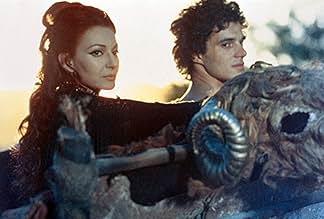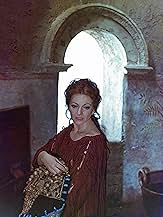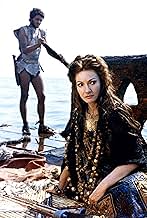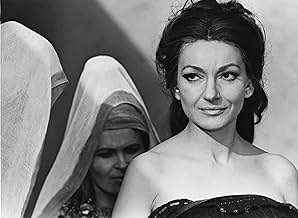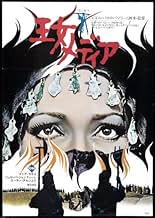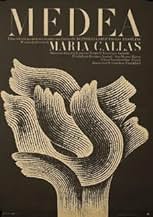After his quest to retrieve the fabled Golden Fleece, Jason returns to Greece with powerful sorceress Medea. However, when the king banishes her, it's only human that Medea plots her furious... Read allAfter his quest to retrieve the fabled Golden Fleece, Jason returns to Greece with powerful sorceress Medea. However, when the king banishes her, it's only human that Medea plots her furious revenge. Can they escape her wrath?After his quest to retrieve the fabled Golden Fleece, Jason returns to Greece with powerful sorceress Medea. However, when the king banishes her, it's only human that Medea plots her furious revenge. Can they escape her wrath?
- Director
- Writers
- Stars
- Awards
- 2 nominations total
- Glauce
- (as Margareth Clementi)
- Wet-nurse
- (as Anna Maria Chio)
- Director
- Writers
- All cast & crew
- Production, box office & more at IMDbPro
Featured reviews
True Myth
When the film opened up and we had the glimpse of a filthy centaur, I was pretty much sold that this film was going to be good, or at least unforgettable. The remainder may not have had as much magic, but it did not disappoint in originality... and cannibalism.
Typically when I think of Italian mythology films, I think of the "sword and sandal" films. This is not one of those. Rather than make the story all romantic and flashy, we get a world that is probably much closer to reality. Assuming that the event told in myth are many, many years BCE, it makes sense to show a much more primitive world than we expect. And in that sense, this film does not disappoint.
Disappointing.
Excellent capture of aspects of the original tragedy
A Savage, Beautiful and Raw Medea
Another ten years went by before I watched it again and after the second viewing, found myself emotionally drained, my jaw on the floor with the realization that I'd just finished a film that alternately horrified, fascinated and astonished me.
Medea is a grim, violent, film, minimally processed which only adds to its gruesome, wild rawness. This is Pasolini's Medea, not Euripedes and it is not easy viewing. Its wild, African/Middle Eastern score with the nasal bleating of women's voices in near pre-historic sounding rhythmic chant adds further to the element of being "out there" this film produces: This is about as far away from popular cinema as one can get. Medea doesn't easily compare to films of any other style or genre; not even with some of Pasolini's other work. But, if you can succumb to its hypnotic, mesmerizing pace at once both frenetic and static - you will realize this is as about as close to a hallucinatory experience one can achieve without the use of an illegal substance. Granted, not everyone wants that experience.
As Medea, Callas is simply amazing. Oddly, when the film came out she was roundly criticized for not being able to transfer the magic she so naturally gave on stage to the big screen. I will strongly disagree. The more I watch this film (which is probably several times a year for well over a decade), the more amazed I am by her performance in it. Where I, too, had first been critical of her languid weirdness, I've grown to see her commitment to the role. I've come to be riveted to her painfully expressive mask as she completely inhabits this character who is, quite literally, capable of everything (yes - everything is the right word here).
Where I was once critical of the lighting, I've grown up to realize what Pasolini did; why he chose to film at the times of day he chose, and the resulting, fascinatingly brutal and surreal luminosity that bathes the entire film and the almost palpable sense of its visual texture. Stunning. The landscapes Pasolini chose to film in are as brutal and as vital as the characters of the tale. His near excision of all spoken text ( the screenplay is nearly dialogue free) brings us into a timeless, yet somehow ancient world where all is understood without the use of verbal communication. The savage, bloody rites of sacrifices for fertility and harvest initially seem barbarous then become somehow beautiful and fascinating. Then they make one cringe with the realization of how, not so long ago, this was us.
A remarkable, savage and beautiful film.
Not my cup of tea but has much to admire about it
Did you know
- TriviaFinal part of Pier Paolo Pasolini's "Mythical Cycle" also including Oedipus Rex (1967), Teorema (1968) and Pigsty (1969).
- GoofsWhen Jason speaks to the two centaurs, there is a mismatch in their shadows in the middle of the screen, indicating that the image is a composite.
- Quotes
Creonte: You frighten me. I'm afraid for my daughter, and I tell you openly. Everyone here knows that as a barbarian who came from a foreign land, you're an expert in evil spirits. You are different from us, so we don't want you among us.
Medea: My knowledge of these things is very poor. And then, have you ever offended me? Only he is responsible - my husband. I am not hurt by your behavior. In fact, it seems fair. I am not even hurt by your happiness. Go ahead with the wedding. Be happy. I just ask a single favor for myself. Don't banish me. Let me stay here. I'll bow my head before those stronger than myself.
Creonte: Your words are sweet and human. But it's impossible to see into the depths of one's soul.
- ConnectionsEdited into Catalogue of Ships (2008)
- How long is Medea?Powered by Alexa
Details
Box office
- Gross worldwide
- $689
- Runtime
- 1h 58m(118 min)
- Sound mix
- Aspect ratio
- 1.85 : 1

